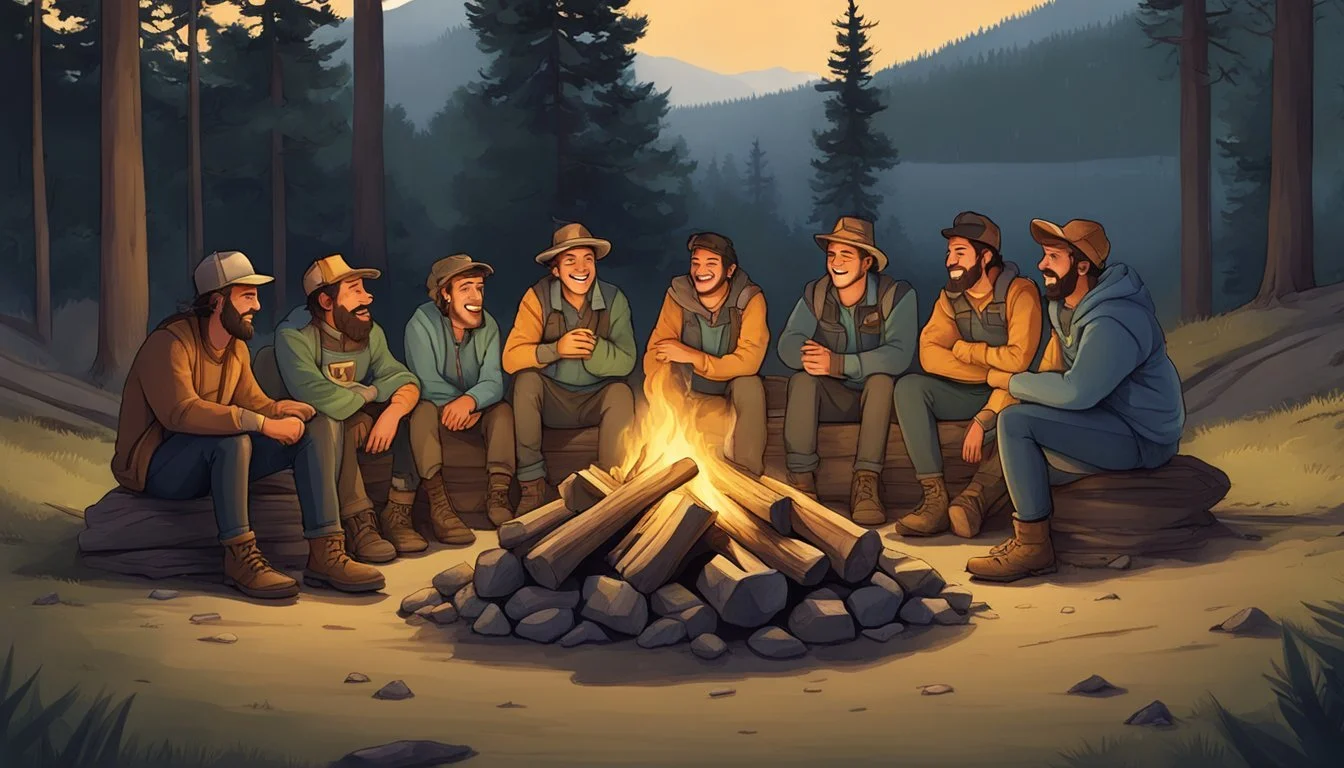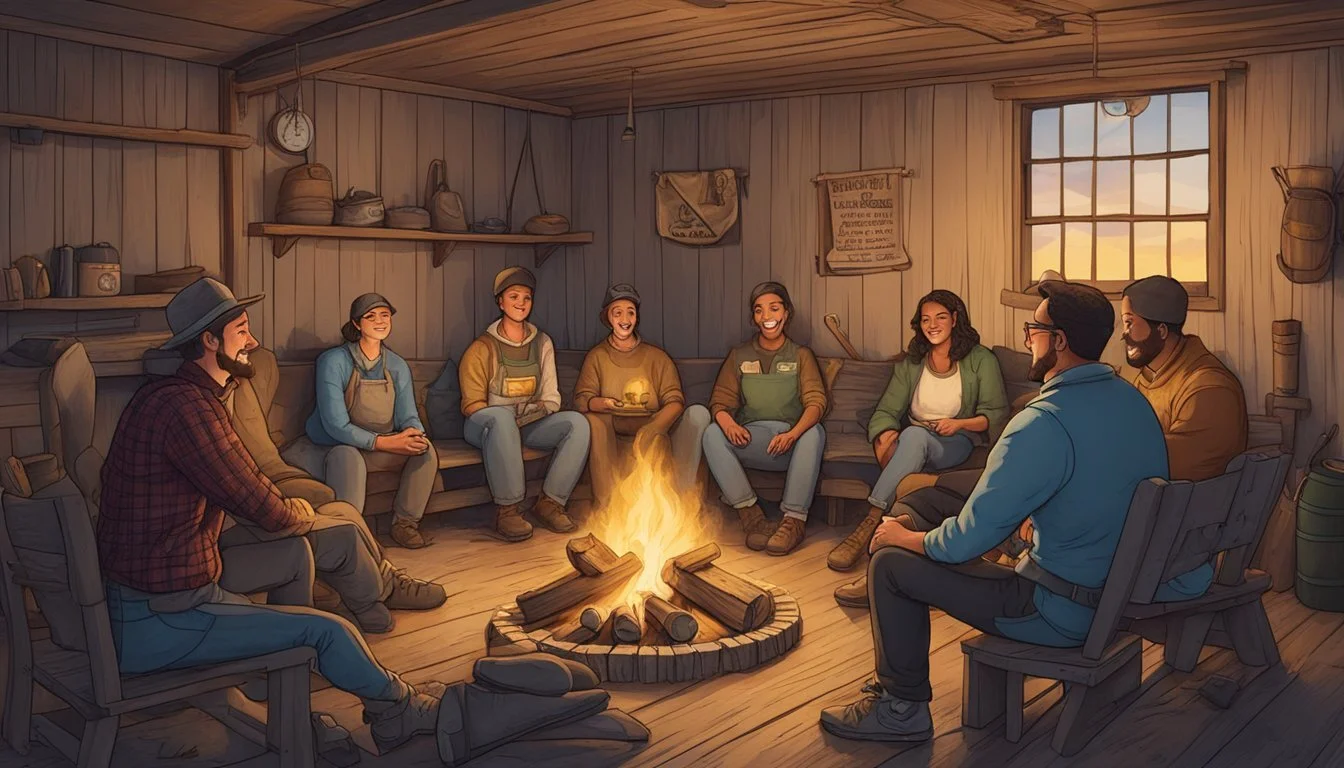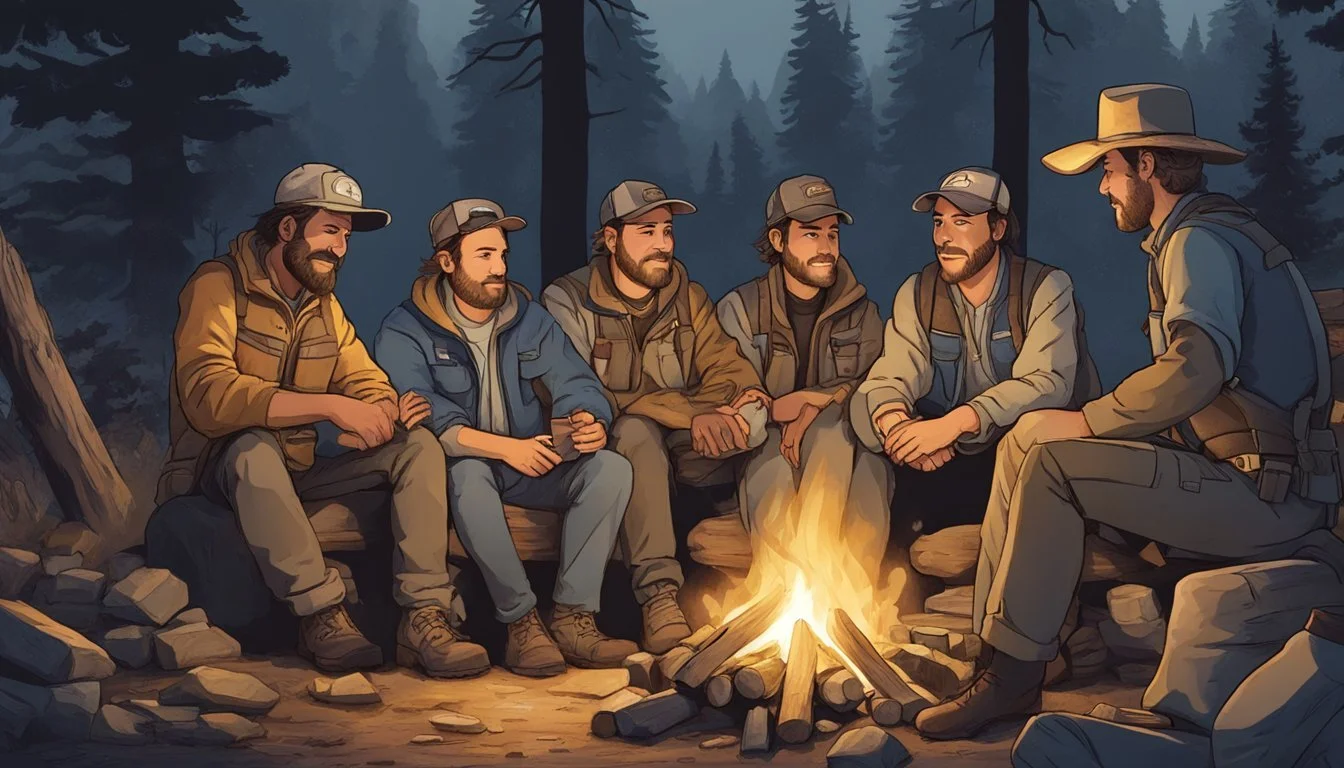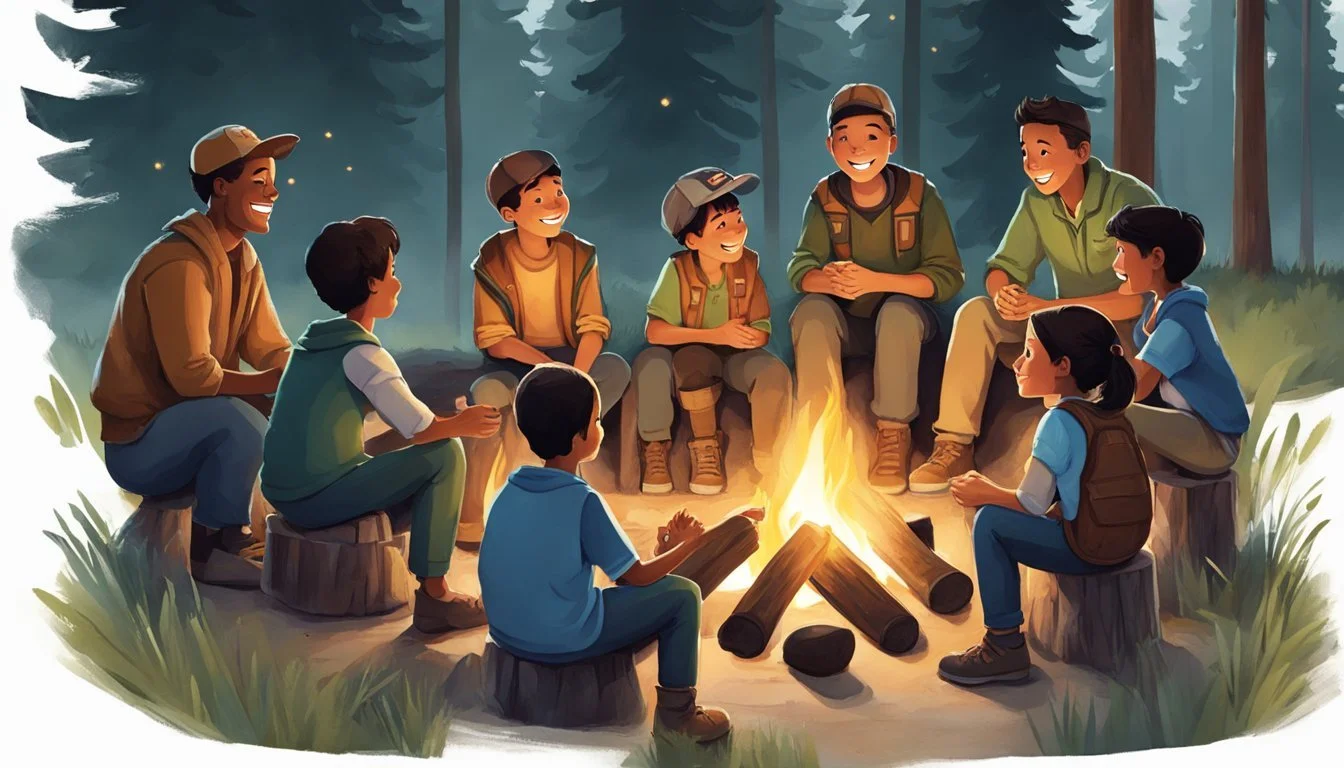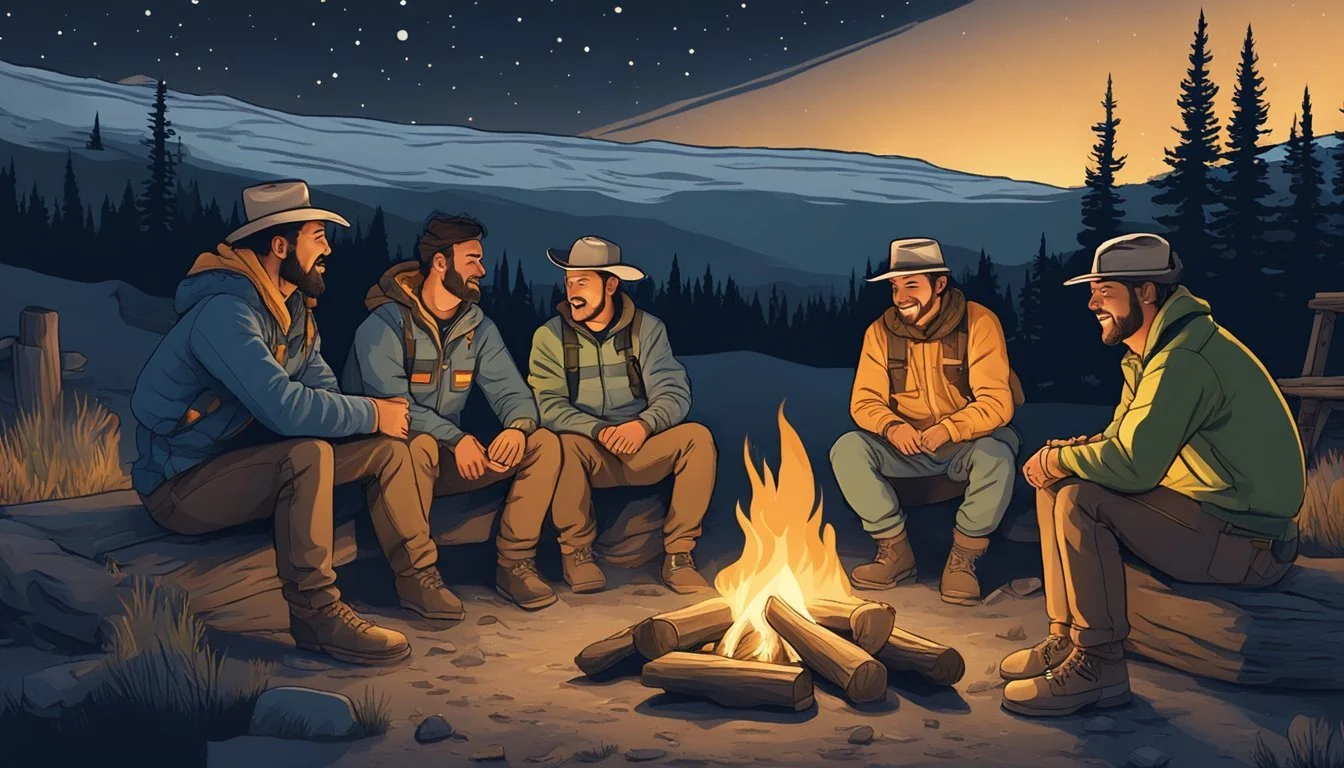Mentorship and Loyalty Among Yellowstone's Bunkhouse Crew
Forging Bonds in the Wild West
The bunkhouse crew on Yellowstone embodies the heart and soul of ranch life. These rough-and-tumble cowboys form a tight-knit family bound by shared experiences and a fierce loyalty to the Dutton Ranch. At the core of their dynamic are the mentor-mentee relationships that shape the younger hands into capable ranch workers.
Lloyd Pierce stands out as a pivotal mentor figure, using his years of experience to guide the next generation of cowboys. His no-nonsense approach and deep respect for cowboy culture make him an invaluable asset to the bunkhouse. Lloyd's wisdom and patient instruction help mold raw recruits into skilled ranch hands, fostering a sense of camaraderie and mutual respect among the crew.
Loyalty runs deep in the bunkhouse, extending beyond mere employment to a profound commitment to the Yellowstone and the Dutton family. This unwavering dedication is exemplified by characters like Rip Wheeler, whose bond with John Dutton and the ranch transcends traditional boss-employee relationships. The bunkhouse crew's loyalty creates a united front, ready to face any challenge that threatens their way of life or the Yellowstone legacy.
The Essence of Yellowstone
Yellowstone captivates audiences with its raw portrayal of modern-day ranch life in the American West. Created by Taylor Sheridan for Paramount Network, the series masterfully blends family drama, political intrigue, and the struggle to preserve a vanishing way of life.
At its core, Yellowstone revolves around the Dutton family's fight to maintain control of their vast cattle ranch. The show's backdrop of breathtaking landscapes, reminiscent of Yellowstone National Park, serves as a character in its own right.
The series delves into themes of loyalty, power, and the clash between tradition and progress. It explores the complex dynamics between ranchers, Native Americans, and land developers, offering a nuanced look at contemporary Western issues.
Yellowstone's authenticity shines through its depiction of ranch operations and cowboy culture. The bunkhouse scenes provide insight into the daily lives and relationships of the ranch hands, showcasing their camaraderie and conflicts.
The show's success lies in its ability to balance high-stakes drama with intimate character moments. It presents a world where honor and violence often intertwine, forcing characters to make difficult moral choices.
Through its compelling storytelling and visual splendor, Yellowstone has become a cultural phenomenon, redefining the modern Western genre for television audiences.
The Dutton Family Legacy
The Dutton family's influence extends far beyond their ranch, shaping the very fabric of Yellowstone. Their legacy is built on a foundation of power, loyalty, and an unwavering commitment to preserving their way of life.
John Dutton's Leadership
John Dutton, portrayed by Kevin Costner, stands as the formidable patriarch of the Dutton family. His leadership style blends rugged determination with a deep connection to the land. John's unwavering resolve to protect his ranch drives many of the show's central conflicts.
He faces numerous challenges, from political adversaries to corporate interests seeking to exploit his land. John's strategic thinking and willingness to make tough decisions have kept the Dutton legacy intact through generations.
His influence on his children is profound, shaping their values and priorities. John's complex relationships with each of them reveal different facets of his character and leadership approach.
Beth Dutton: Strength and Vulnerability
Beth Dutton emerges as a force of nature within the family dynamic. Her fierce loyalty to her father and the Dutton legacy is matched only by her razor-sharp business acumen.
Beth's strength often manifests in her ruthless tactics against those who threaten her family's interests. Yet beneath her hard exterior lies a vulnerability stemming from past traumas and complex family relationships.
Her devotion to the Dutton cause is unwavering, often putting her at odds with her own brother Jamie. Beth's character arc showcases her growth from a troubled individual to a key player in securing the family's future.
Kayce Dutton's Journey
Kayce Dutton's path within the family legacy is marked by internal conflict and a search for identity. As a former Navy SEAL, he brings a unique skill set to the ranch operations.
His marriage to Monica, a Native American woman, adds complexity to his role within the Dutton family. Kayce often finds himself torn between his duties to the ranch and his desire for a life outside of its demanding confines.
Throughout the series, Kayce's journey involves reconciling his family loyalty with his personal aspirations. His character development reflects the broader themes of tradition versus progress that run through the show.
Jamie Dutton's Ambitions
Jamie Dutton, played by Wes Bentley, represents a different facet of the Dutton legacy. His legal education and political ambitions often put him at odds with the family's more traditional approach to maintaining power.
Jamie's complex relationship with his adoptive family, particularly his sister Beth, creates tension and drives many plot points. His desire for recognition and power sometimes leads him to make decisions that threaten the family's interests.
His character arc explores themes of belonging, loyalty, and the cost of ambition. Jamie's struggles highlight the internal conflicts that can arise within a powerful family legacy.
Life at the Bunkhouse
The bunkhouse at Yellowstone Ranch serves as the heart of cowboy life, fostering loyalty and camaraderie among the ranch hands. It's a place where seasoned cowboys mentor newcomers and where the challenges of ranch work are balanced with moments of bonding and reflection.
Ranch Hands' Daily Challenges
Ranch hands at Yellowstone face numerous physical and mental challenges daily. They rise before dawn to tend to livestock, mend fences, and handle various ranch duties. The work is grueling, often involving long hours in harsh Montana weather.
Injuries are common, from rope burns to broken bones. Ranch hands must be tough and resilient to endure these hardships.
Despite the difficulties, there's a sense of pride in their work. The bunkhouse provides a refuge where they can rest and recover after a hard day's labor.
The Role of the Cowboy
Cowboys at Yellowstone Ranch embody the spirit of the American West. They're skilled horsemen, expert ropers, and guardians of cowboy culture.
Their duties extend beyond cattle management. They protect the ranch's interests, sometimes engaging in confrontations with outsiders who threaten the Dutton family's land.
The cowboy's role is steeped in tradition. They uphold a code of honor, loyalty, and hard work that defines life at the bunkhouse.
Lloyd Pierce's Cowboy Wisdom
Lloyd Pierce, the senior ranch hand, is a font of cowboy wisdom. His years of experience make him a respected figure in the bunkhouse.
Lloyd's advice often comes in the form of pithy sayings or practical demonstrations. He teaches younger cowboys about horse training, cattle handling, and the unwritten rules of ranch life.
His mentorship extends beyond work skills. Lloyd guides others through the complex dynamics of loyalty to the Dutton family and the importance of the Yellowstone brand.
Jimmy's Transformation
Jimmy's journey from inexperienced newcomer to capable ranch hand exemplifies the transformative power of bunkhouse life. Initially clumsy and unsure, Jimmy faces numerous setbacks and injuries.
Through perseverance and the guidance of more experienced cowboys, Jimmy gradually improves his skills. He learns to ride, rope, and earn his place among the crew.
Jimmy's growth reflects the bunkhouse's role in shaping raw recruits into valuable team members. His story resonates with the theme of second chances that runs through Yellowstone Ranch.
Walker's Outsider Perspective
Walker brings a unique perspective to the bunkhouse as a former convict turned cowboy. His arrival disrupts the established order, challenging the other ranch hands' notions of loyalty.
Unlike many of his bunkmates, Walker questions the more extreme aspects of ranch life. He's reluctant to engage in some of the Duttons' darker dealings.
Walker's presence highlights the tension between individual morality and group loyalty within the bunkhouse. His guitar playing and singing add a softer dimension to the often harsh realities of ranch life.
Rip Wheeler: The Foreman's Code
Rip Wheeler embodies the essence of leadership and loyalty at the Yellowstone Dutton Ranch. As foreman, he upholds a strict code of conduct that shapes the bunkhouse culture and mentors the next generation of ranch hands.
Rip's Mentorship and Leadership
Rip Wheeler, portrayed by Cole Hauser, leads the bunkhouse crew with a firm hand and unwavering principles. His leadership style combines tough love with genuine care for those under his charge. Rip's mentorship focuses on instilling the values of hard work, resilience, and loyalty to the ranch.
He pushes his team to their limits, expecting nothing less than their best. Through his guidance, young ranch hands learn the ropes of cowboy life and the importance of unity in facing challenges. Rip's own troubled past informs his approach, allowing him to connect with and understand the struggles of those he mentors.
The Bonds of Loyalty at Yellowstone
Loyalty is the cornerstone of Rip Wheeler's code at the Yellowstone Dutton Ranch. His unwavering dedication to the Dutton family sets the standard for all who work under him. This loyalty extends beyond mere employment; it's a way of life that defines the ranch's culture.
Rip fosters a sense of brotherhood among the bunkhouse crew, creating bonds that withstand the toughest trials. He leads by example, demonstrating that loyalty means standing together in the face of adversity. His actions inspire a deep-seated commitment in others, forming a tight-knit community within the ranch.
This loyalty is not blind obedience but a mutual trust built on shared experiences and respect. Rip's code ensures that each member of the crew understands their role in protecting the ranch's legacy and the Dutton family's interests.
Challenges and Adversities
The Yellowstone Ranch crew faces numerous obstacles that test their resilience and loyalty. From the harsh realities of ranch life to interpersonal conflicts, these challenges shape the dynamics of the bunkhouse and its inhabitants.
Nature of Ranch Operations
Ranch work on Yellowstone is physically demanding and often dangerous. Cowboys endure long hours in harsh weather conditions, tending to livestock and maintaining vast acres of land. Injuries are common, with risks ranging from horse-related accidents to encounters with wildlife.
The unpredictable nature of cattle markets adds financial stress to ranch operations. Fluctuating prices can impact the ranch's profitability and job security for the bunkhouse crew. This economic uncertainty creates tension among workers and management.
Natural disasters like wildfires and droughts pose significant threats to the ranch's livelihood. The crew must be prepared to protect the land and animals at a moment's notice, often putting their own lives at risk.
Overcoming Personal and External Conflicts
Power struggles within the bunkhouse are a constant source of tension. Seasoned ranch hands clash with newcomers, leading to heated arguments and physical altercations. These conflicts test the leadership skills of characters like Rip Wheeler and Lloyd Pierce.
Family drama from the Dutton clan often spills over into ranch operations. The crew finds themselves caught in the crossfire of Dutton power plays, forcing them to navigate complex loyalties.
External threats from land developers, rival ranchers, and government agencies create a siege mentality among the bunkhouse crew. They must band together to protect the ranch from those seeking to exploit or destroy it.
Personal demons plague many characters, from addiction issues to past traumas. Overcoming these individual challenges while maintaining their duties on the ranch adds depth to the bunkhouse dynamics.
Culture and Traditions
The bunkhouse on Yellowstone Ranch embodies the heart of cowboy culture, balancing time-honored traditions with the pressures of a changing world. It serves as a microcosm of the American West, where values like grit, hard work, and loyalty are prized above all else.
The Cowboy Archetype and Authenticity
Yellowstone's bunkhouse crew exemplifies the cowboy archetype, embracing qualities like courage, honor, and integrity. Characters like Rip Wheeler and Lloyd Pierce represent seasoned ranch hands who embody these ideals. They demonstrate unwavering loyalty to the Dutton family and uphold the unwritten codes of ranch life.
The show's creators prioritize authenticity, showcasing real cowboy skills and daily ranch operations. This attention to detail resonates with viewers, offering a glimpse into a lifestyle that values perseverance and practical knowledge. The bunkhouse becomes a stage where these traits are put to the test, reinforcing the importance of staying true to one's roots.
Tradition vs. Transformation
While the bunkhouse preserves many traditional aspects of ranch life, it also grapples with the need for adaptation. Newer characters like Jimmy represent the clash between old ways and modern influences. This tension creates opportunities for mentorship, as experienced hands guide newcomers in navigating the complexities of ranch culture.
The struggle to maintain tradition in the face of external pressures becomes a central theme. Economic challenges, land disputes, and changing societal norms all threaten the bunkhouse way of life. Yet, the crew's resilience and commitment to their shared values often prove to be their greatest strengths in confronting these obstacles.
Character Development and Dynamics
Yellowstone's bunkhouse crew undergoes significant personal growth and relationship changes throughout the series. Their complex dynamics reveal the human experience in all its raw vulnerability and emotional depth.
Complex Relationships and Human Experience
The bunkhouse serves as a microcosm of human relationships. Characters form deep bonds, experience heartbreak, and navigate conflicts. Rip Wheeler and Lloyd Pierce share a father-son dynamic, with Lloyd acting as a mentor figure. Their relationship showcases loyalty and mutual respect forged through years of shared experiences.
Jimmy Hurdstrom's journey from inexperienced ranch hand to capable cowboy highlights the importance of mentorship. His interactions with more seasoned workers reveal both camaraderie and tough love. These relationships test characters' resolve and push them to confront their own vulnerabilities.
The romantic entanglements within the bunkhouse add another layer of complexity. Walker and Laramie's relationship creates tension, particularly with Lloyd. This love triangle exposes jealousies and insecurities, driving character growth and plot development.
Character Arcs and Personal Growth
Each bunkhouse character undergoes a distinct arc, facing personal challenges that shape their development. Rip's journey from troubled youth to trusted ranch foreman showcases his growth in leadership and emotional maturity. His relationship with Beth Dutton reveals a softer side beneath his tough exterior.
Jimmy's transformation is perhaps the most dramatic. He evolves from a liability to a valuable team member, gaining confidence and skills along the way. His arc demonstrates the power of perseverance and mentorship in personal development.
Colby and Teeter's relationship illustrates how unexpected connections can lead to personal growth. Their bond challenges preconceptions and forces both characters to confront their own biases and fears.
Ryan and Kayce's friendship highlights the complexities of loyalty within the ranch hierarchy. Their interactions reveal the delicate balance between personal relationships and professional duties.
Reflections on Past Seasons
Yellowstone's bunkhouse crew has undergone significant changes and faced numerous challenges over the years. Key moments in Season 4 set the stage for major developments in Season 5, shaping the dynamics of mentorship and loyalty among the ranch hands.
Defining Moments from Season 4
Season 4 brought intense trials for the bunkhouse crew. Rip Wheeler's leadership was tested as he navigated the aftermath of the Dutton family attacks. Lloyd Pierce's loyalty wavered during his feud with Walker, leading to a brutal fight that reshaped bunkhouse dynamics.
Jimmy's journey to the 6666 Ranch in Texas marked a turning point, showcasing the importance of mentorship beyond Yellowstone's borders. The season highlighted the crew's resilience and adaptability in the face of external threats and internal conflicts.
Anticipated Developments in Season 5
Season 5 promised to build on the foundation laid by previous seasons. Fans expected to see the long-term effects of Lloyd's actions and his path to redemption within the bunkhouse hierarchy. Rip's role as a mentor was likely to expand, with new challenges testing his leadership skills.
The return of Jimmy and the potential for new ranch hands joining the crew set the stage for fresh dynamics and loyalties to form. Viewers anticipated a deeper exploration of the bonds between longtime bunkhouse members and how they navigate changing circumstances on the ranch.
A: Assistant H: Can you write a paragraph on how season 5 lived up to those expectations?
A: Season 5 delivered on many fronts, exceeding expectations in some areas while subverting them in others. The bunkhouse dynamics evolved in unexpected ways, with Lloyd gradually regaining trust and respect among his peers. Rip's mentorship role intensified as he faced new challenges balancing his responsibilities to the ranch and his growing family.
Jimmy's return brought fresh perspectives, influencing the crew's outlook on loyalty and personal growth. New additions to the bunkhouse stirred up both camaraderie and conflict, testing established relationships. The season masterfully wove themes of legacy and transformation throughout, highlighting how each character's journey contributed to the collective strength of the Yellowstone ranch family.
H: Great! Now can you write a paragraph on some of the most memorable moments from season 5?
A: Season 5 of Yellowstone offered several unforgettable moments that left a lasting impact on viewers. The emotional scene where Rip comforted a grieving Beth showcased their deep bond and Rip's growth as a partner. A tense standoff between the bunkhouse crew and outside threats highlighted their unity and resourcefulness under pressure.
Lloyd's heartfelt speech to the younger ranch hands about the true meaning of loyalty resonated deeply. The unexpected alliance between Jamie and a key antagonist sent shockwaves through the ranch. A poignant flashback revealing John Dutton's early mentorship of young Rip provided crucial context to their enduring relationship. These moments collectively reinforced the show's themes of family, loyalty, and the complex nature of power in the modern West.
H: Can you write a paragraph on how season 5 explored the theme of mentorship?
A: Season 5 delved deeper into the theme of mentorship, showcasing its multifaceted nature on the Yellowstone ranch. Rip's role as a mentor expanded beyond the bunkhouse, as he guided both seasoned hands and newcomers through increasingly complex challenges. His approach evolved, blending tough love with newfound patience and understanding.
The season also explored reverse mentorship, with younger characters like Teeter and Ryan offering fresh perspectives that influenced their more experienced counterparts. John Dutton's flashbacks provided insight into how mentorship shaped the ranch's current leadership. The show skillfully portrayed mentorship as a two-way street, emphasizing how both mentor and mentee grow through their interactions. This nuanced exploration added depth to character relationships and highlighted the crucial role of knowledge transfer in preserving the ranch's legacy.
H: Great! Now can you write a paragraph on how the bunkhouse crew's loyalty was tested in season 5?
A: Season 5 put the bunkhouse crew's loyalty to the ultimate test. External pressures from rival ranchers and political forces strained relationships within the group. Some crew members faced difficult choices between personal aspirations and their commitment to the Yellowstone. The arrival of new hands with different backgrounds and motivations created friction, challenging established loyalties.
A major crisis forced each member to reevaluate their allegiance to the Duttons and to each other. Long-held secrets came to light, shaking the foundation of trust built over years. Through these trials, the true strength of their bonds emerged. Some loyalties were reinforced, while others unexpectedly shifted. The season masterfully illustrated that loyalty on the Yellowstone is not just about blind obedience, but about making tough decisions in the face of conflicting obligations.
H: Great! Can you write a concluding paragraph that summarizes the key points about mentorship and loyalty in season 5?
A: Season 5 of Yellowstone expertly wove themes of mentorship and loyalty throughout its narrative. The bunkhouse crew faced unprecedented challenges that tested their bonds and forced them to adapt. Rip's evolution as a mentor reflected the changing dynamics on the ranch, while new characters brought fresh perspectives to established relationships.
Loyalty was explored in its many forms, from unwavering dedication to difficult choices that challenged long-held allegiances. The season highlighted how mentorship and loyalty are interconnected, shaping the characters' growth and the ranch's future. Through intense conflicts and poignant moments, Season 5 reinforced the idea that the strength of the Yellowstone lies not just in its land, but in the complex web of relationships forged in its bunkhouse.
H: Great! Based on all of the above, can you update the Reflections on Past Seasons section with the new information?
A: ## Reflections on Past Seasons
Yellowstone's bunkhouse crew has undergone significant transformations, facing numerous challenges that have tested their loyalties and reshaped mentorship dynamics. Key moments from recent seasons have set the stage for compelling character arcs and intense storylines, highlighting the complex relationships within the ranch.
Defining Moments from Season 4
Season 4 brought intense trials for the bunkhouse crew. Rip Wheeler's leadership was tested as he navigated the aftermath of the Dutton family attacks. Lloyd Pierce's loyalty wavered during his feud with Walker, leading to a brutal fight that reshaped bunkhouse dynamics.
Jimmy's journey to the 6666 Ranch in Texas marked a turning point, showcasing the importance of mentorship beyond Yellowstone's borders. The season highlighte
Representations of Justice and Integrity
The bunkhouse crew in Yellowstone embodies a unique code of justice and integrity rooted in cowboy culture. Their actions reflect a strong sense of honor and loyalty to the Dutton Ranch and its values.
Justice on the ranch often takes unconventional forms. The crew adheres to an unwritten set of rules that prioritize protecting the ranch and its interests above all else. This sometimes leads to morally ambiguous decisions and actions.
Integrity is highly valued among the bunkhouse members. They pride themselves on keeping their word and following through on commitments. This unwavering dedication builds trust within the group and strengthens their bonds.
The characters frequently grapple with ethical dilemmas. They must balance personal moral codes against the demands of ranch life and their loyalty to the Duttons. This internal struggle adds depth to their portrayals.
Lloyd Pierce stands out as a mentor figure who exemplifies these principles. His no-nonsense attitude and deep respect for cowboy traditions make him a trusted advisor to younger ranch hands.
The bunkhouse crew's approach to justice and integrity reflects broader themes of rugged individualism and self-reliance. These qualities have long been associated with the American West and continue to shape the show's narrative.

